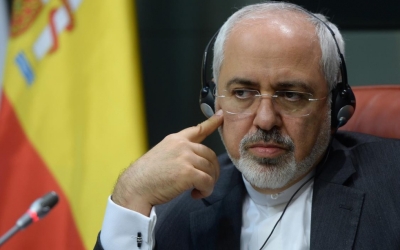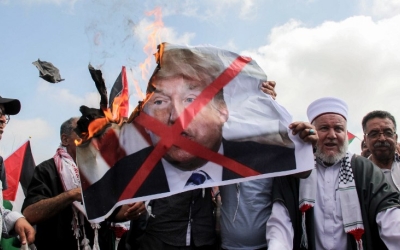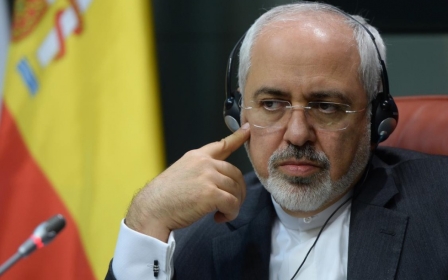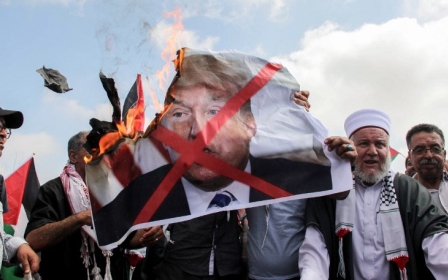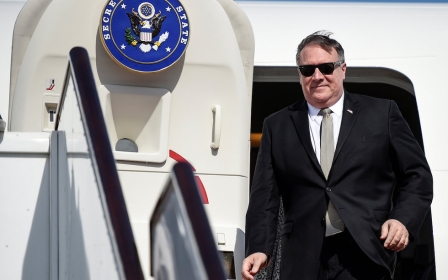Netanyahu hails increasing Arab-Israeli ties against Iran at Warsaw conference

Israeli Prime Minister Benjamin Netanyahu met Oman's foreign minister on the sidelines of a US-sponsored Middle East conference in Warsaw on Wednesday and hinted that other Arab countries represented there were engaging with Israel.
Foreign ministers and senior officials from 60 nations gathered in the Polish capital on Wednesday as the United States hoped to ratchet up pressure against Iran despite concerns among major European countries over the strategy.
The absence of foreign ministers from major European powers Germany and France highlights festering tensions with the European Union over US President Donald Trump's decision last year to withdraw from a 2015 nuclear deal with Iran and reimpose sanctions.
Though Trump's decision has angered some of US' European allies, it has been welcomed by Israel and Iran's Gulf Arab allies who are vehemently anti-Iran.
New MEE newsletter: Jerusalem Dispatch
Sign up to get the latest insights and analysis on Israel-Palestine, alongside Turkey Unpacked and other MEE newsletters
Netanyahu has been keen to play up increasing relations between Israel and other Arab states as a means of combatting their mutual foe.
"Many are following in your footsteps, including among those here today at the conference," a statement released by Netanyahu's office quoted him telling Oman's Foreign Minister Yousuf bin Alawi bin Abdullah, whose Gulf state hosted the Israeli leader in October.
Oman does not formally recognise Israel. Nor do Saudi Arabia and United Arab Emirates, which share Israel's concerns about Iranian actions in the region and also sent envoys to Warsaw.
Netanyahu hailed the fact that his meeting with bin Alawi took place openly.
"What is important about this meeting - and this meeting is not in secret, because there are many of those – is that this is an open meeting with representatives of leading Arab countries, that are sitting down together with Israel in order to advance the common interest of war with Iran," he said in a statement released by his office.
Speaking to Netanyahu, bin Alawi said: "People in the Middle East have suffered a lot because they have stuck to the past. Now we say, this is a new era, for the future."
Federica Mogherini, the EU's foreign policy chief, who was a key player in the Iran nuclear deal, said she would not be attending the two-day conference due to scheduling issues although US Secretary of State Mike Pompeo will travel to Brussels on Friday to meet with her.
In other policy differences, Washington's European allies have also voiced concern over Trump's decision to withdraw US troops from Syria.
Pompeo, who will be joined by US Vice President Mike Pence in Warsaw, played down the absence of leading European ministers at the event during a brief stop in the Slovak capital Bratislava on Tuesday, before he headed to Warsaw.
"Some countries are having their foreign ministers come. Other countries are not. That's their choice," he told a news conference.
"We think we will make real progress. We think there'll be dozens of nations there seriously working towards a better, more stable Middle East, and I'm hoping by the time we leave on Thursday we'll have achieved that," he added.
'Dead on arrival'
Last month, Iran's foreign ministry summoned Poland's charge d'affaires to tell them that Tehran saw the country's decision to host the conference as a "hostile act against Iran".
Iranian Foreign Minister Mohammad Javad Zarif said on Wednesday that the two-day conference was "dead on arrival".
"It is another attempt by the United States to pursue an obsession with Iran that is not well-founded," Zarif told a Tehran news conference.
"I think the fact that they are not aiming to issue any agreed text but rather are just attempting to use their own statement on behalf of everybody else shows they don't have any respect for it themselves.
"You usually don't bring 60 countries and states together in order to speak for them. That indicates to you that they don't believe they have anything to gain from this meeting."
This is an open meeting with representatives of leading Arab countries, that are sitting down together with Israel in order to advance the common interest of war with Iran
- Benjamin Netanyahu, Israeli prime minister
Zarif said most of the states going to the conference were doing so due to pressure from the US.
"They used their money, they used their influence, they used the military might of the United States," he said.
"They used the leverage they have with various countries in order to attract more people to this conference.
"Many [countries] going there have told us that [they] don't have any other choice," the foreign minister added.
Trump's lawyer Rudy Giuliani addressed an event on the sidelines of the conference hosted by the National Council of Resistance of Iran, also known as the Mojahedin e-Khalq (MEK), an opposition group that actively calls for regime change in Iran.
Giuliani, who along with National Security Advisor John Bolton is a longtime supporter of the group, said the Islamic Republic needed to "end quickly" for stability in the region to prevail.
“It’s a great honor for me to be here with you in order to make a very important point to all of the government officials who are meeting across the way in the stadium," he said.
“In order to have peace and security in the Middle East, there has to be a major change in the theocratic dictatorship in Iran. It must end, and end quickly, in order to have peace and stability.”
The Albania-based MEK have long been outlawed in Iran and have repeatedly been described as a "cult-like" organisation.
'Poland is just the implementer'
Despite the Iranian criticism, hosting the event has been seen as a chance for Poland's conservative government to bolster its ties with Washington at a time when it faces mounting isolation within the EU amid a dispute over its adherence to rule of law standards.
"It's a clear effort to underline their desire to please Washington," said Piotr Buras, a director of the Warsaw office of the ECFR think tank.
"The goals of the conference are also defined by the US, not by Poland. Poland is just the implementer."
Polish Foreign Minister Jacek Czaputowicz said transatlantic cooperation was necessary to resolve problems in the Middle East.
"The European Union alone does not, in my opinion, carry sufficient political weight to try to really influence the situation in the Middle East," he told reporters in Warsaw.
"Only working together with the United States, and broadly speaking the community of democratic countries, can we have a positive influence and achieve peace and the stabilisation of the situation in the Middle East."
However, a joint opinion piece by Czaputowicz and Pompeo published by CNN on Wednesday indicated that even Warsaw and Washington were not in agreement on how to handle the Iran issue.
An excerpt from the piece read: "We expect each nation to express opinions that reflect its own interests. Disagreements in one area should not prohibit unity in others.
"In the past, for example, our two nations have taken distinct positions on the Iran nuclear deal. Despite these strong differences of opinion, the US-Poland relationship remains strong."
Kushner address
The conference will also hear from White House adviser Jared Kushner, who is Trump's son in law, over plans by the US for peace between Palestinians and Israelis, touted as "the deal of the century".
Palestinian Authority President Mahmoud Abbas has derided the plan as "the slap of the century," and has said he will not commit “treason” by agreeing to it.
According to Palestinian officials, they are likely to be offered provisional borders over fragments of land comprising about half the occupied territories – or just 11 percent of what was recognised as Palestine under the British mandate.
The Palestinian areas would be demilitarised, and Israel would have control over the borders and airspace.
While Kushner is not likely to divulge too many details of the plan, it will be one of the first occasions he will publicly discuss the US efforts.
It was unclear exactly which ministers would be attending since organisers refused to release the list of participants ahead of Wednesday's meeting, the Reuters news agency reported.
Palestinian officials said they would not attend the Warsaw conference because of Washington's decision to move the US embassy to Jerusalem.
'Malign behaviour'
While countries such as France, Germany and Britain have opened a new channel for non-dollar trade with Iran to avert US sanctions and keep the nuclear deal afloat, they have criticised Tehran's ballistic missile programme.
"There will be discussions about Iran's influence in the Middle East, what we can do to help get Iran on a more helpful footing than it has been, to collectively push back on some of its malign behaviour in the region," a senior US official said of the Warsaw agenda.
New US sanctions, mainly targeted at cutting off revenue from Iran's oil sector, have largely succeeded in persuading European companies to abandon business with Tehran.
Iran has threatened to pull out of the deal unless the European powers enable it to receive economic benefits. The Europeans have promised to help companies do business with Iran as long as it abides by the deal.
Michal Baranowski, who heads the Warsaw office of the German Marshall Fund, said the outcome of the conference could either showcase divisions or more agreement over Iran.
"The proof is very much in the pudding whether this conference is something that will show great consensus or whether it will show greater division," he told Reuters.
Middle East Eye delivers independent and unrivalled coverage and analysis of the Middle East, North Africa and beyond. To learn more about republishing this content and the associated fees, please fill out this form. More about MEE can be found here.


